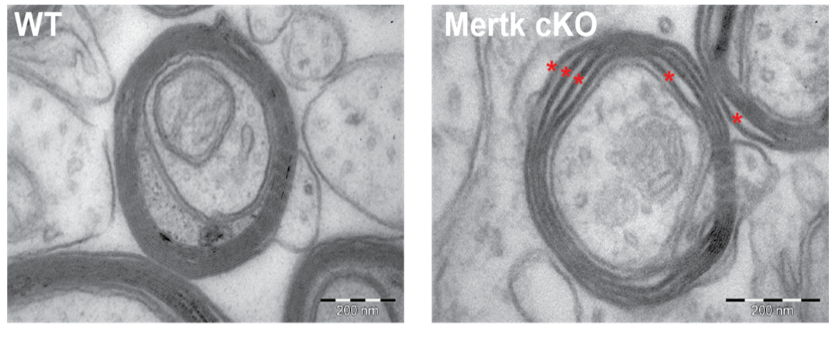Microglia in myelination
In a surprising finding, it is apparent that microglia, a type of immune cell found in the brain, make an important contribution to the formation of myelin. We have recently identified that the disruption of Mertk, a key regulator of microglial behaviour, leads to abnormal myelination, including alterations in myelin thickness and decompaction.
This project builds upon our finding that microglia play a previously unsuspected role in the formation and remodelling of myelin; a process that is dependent upon the TAM receptor Mertk.
Aim
- Identify how microglia interact with myelin to fine-tune structure.
- Understand how microglia interact with myelin and the myelin-producing cells of the CNS to adapt myelin to the needs of axons, and specifically how the TAM receptor Mertk regulates this process.
- Futher investigate how microglia are involved in the remodelling of myelin.
The key focus of the project is to understand how microglia interact with myelin. To achieve this, we will use unique genetically modified mice to examine the molecular mechanisms underpinning microglial control of myelin formation. Importantly, we will also focus upon the functional outcomes of myelin changes, providing context and relevance to our structural and molecular studies. In addition to advancing our knowledge of how the nervous system develops and functions, these studies will, in the future, be applicable for understanding the mechanisms involved in the development of diseases which involve dysmyelination (such as schizophrenia) and demyelination (such as multiple sclerosis).
Understanding how microglia modulates myelin formation will also open up new avenues of research into neural plasticity, which by definition has implications for learning and memory.

Figure 1: Myelin ultrastructure is altered in the absence of Mertk in microglia, showing regions of abnormally compacted myelin.
Research team
Supervisor
Research group
Take part in this project
Student applications
Students who are applying to study at The Florey can register their interest in this project. Refer to our step-by-step guide to help you with your application.
Contact us
If you’re interested in learning more about this project please contact our team.
